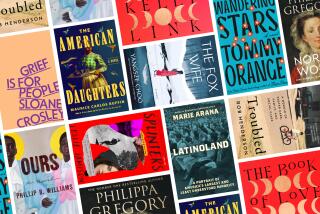‘The Golden Bowl’
If these columns enjoy the attention of anyone such as the last century’s Constant Reader, that dutiful person may recall that on Jan. 20 in these pages I wrote in praise of Flo Gibson, stalled for the moment by laryngitis in the middle of narrating her 469th book, Henry James’ “The Golden Bowl.”
After the appearance of that interview, Gibson gently chided me for having misquoted her on the reason for her abandoning the stage, where she felt doomed to play the Irish maid forever, and turning to radio for her career. I had said it was because of her youth, but in fact it was because of her height.
As I predicted, the completed narration of one of James’ later masterpieces (1904)--”It’s a very difficult book to narrate,” as she said--has been completed without the hint of a rasp in her voice.
One of the difficulties of both narrating and reading this extraordinary creation is the need for communicating, in the first instance, and submitting to, in the second, the world of Jamesian values outside the realities of daily living. Adam Verver, an American millionaire in his middle 40s, and his daughter, Maggie, have come to Europe in order to realize Mr. Verver’s dream of assembling a grand gathering of the Western world’s finest masterpieces of art.
Unlike most millionaires of his generation, Verver is a man of highly cultivated taste, needing no advice as to what he needs to buy and store “in Paris, in Italy, in Spain, in warehouses, vaults, banks, safes, wonderful secret places” before he bestows all this largess upon his native American City in a magnificent museum.
In Italy, he collects not only art, but, almost casually, the penniless Prince Amerigo as a husband for Maggie. In England, after this marriage and the birth of a principino , Maggie realizes that the intimate relationship between father and daughter has been threatened, leaving her father emotionally adrift.
She persuades her American friend, Charlotte Stant, to join them as a companion for Adam Verver at The Fawns, an enormous country place that Verver has rented, a companionship that ends in marriage. Only in the fictional world created by James can one take as more than contrived coincidence the revelation that Charlotte and the Prince have at one time been lovers, but have broken apart because neither of them has the money to support the sort of life they both wish to live.
The novel, which James originally planned as “The Marriages,” takes its title from the opening scene, in Bond Street, before Maggie’s marriage. Charlotte has asked the Prince to help her find a “funny,” suitably inexpensive present for Maggie, and a dealer offers her a gold-encrusted crystal bowl that is almost invisibly flawed. Charlotte actually offers it to the Prince himself, but he rejects it as ominously suggestive of his future.
Isolated from the greater world at The Fawns, Verver and Maggie concentrate their attention on the principino . Inevitably, Charlotte and Amerigo, bored in this nursery atmosphere, finally renew their earlier relationship. In one of James’ most direct sexual statements, Charlotte remarks that the situation might have been different if she herself had borne a child, but she has not, and she makes clear that the fault is not hers.
Ultimately, with all the principals aware of the situation, Adam Verver determines to resolve it by taking Charlotte back to America, never to return. By now, the reader’s (listener’s) consciousness has become so saturated in the Jamesian world of moral values that the rescue and total recovery of Maggie’s marriage appears altogether possible and reasonable.
It is the communication of this world that makes Flo Gibson’s superb interpretation--with all the varying tones of the cast of characters as they speak both directly and indirectly of their complex relationships--in these cassettes such a triumph of narration.
James himself was unaware of how far his fascination with achieving a perfect balance between the two parts of the novel had led him from the world of actual experience. Thinking that this had been part of his intention, Edith Wharton, herself concerned with the technical aspects of fiction, took advantage of her friendship with him to ask him directly:
“ ‘What was your idea in suspending the four principal characters in “The Golden Bowl” in the void? . . . Why have you stripped them of all the human fringes we necessarily trail after us through life?’ He looked at me in surprise, and I saw at once that the surprise was painful, and wished I had not spoken. . . . But after a pause of reflection he answered in a disturbed voice: ‘My dear--I didn’t know I had!’ ”
WHERE TO ORDER TAPES: Classic Books on Cassettes, P.O. Box 40115, Washington, D.C. 20016-0115. For either purchase or rental, call 202-363-3429.
More to Read
Sign up for our Book Club newsletter
Get the latest news, events and more from the Los Angeles Times Book Club, and help us get L.A. reading and talking.
You may occasionally receive promotional content from the Los Angeles Times.






